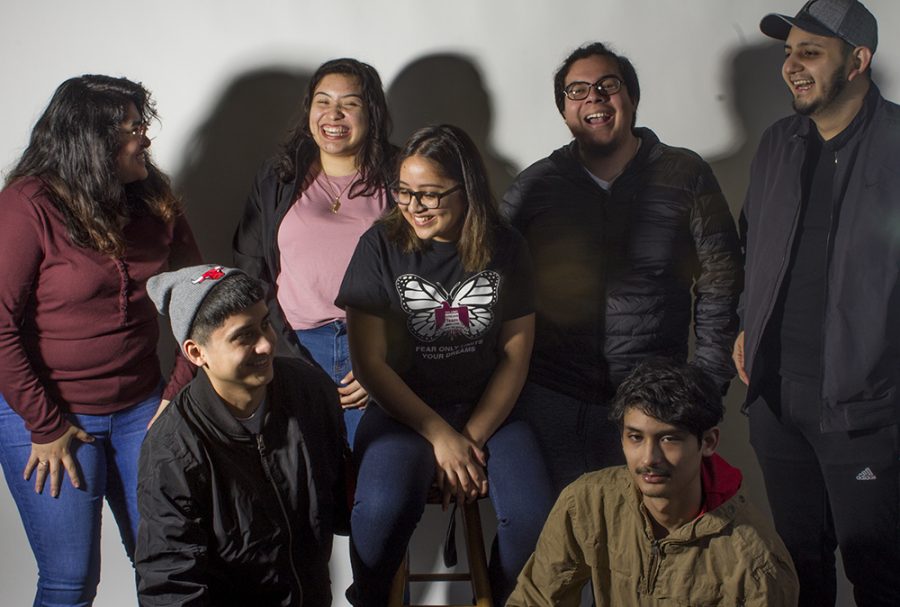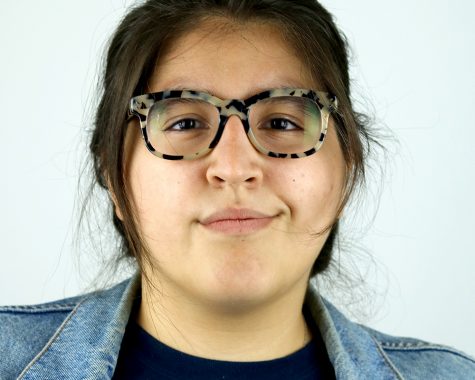Student Spotlight: Muruato’s journey for her future
Junior sociology major Yesenia Muruato sits on a stool surrounded by her roommates and friends. Muruato said her she has the best roommates because they make her happy especially when life becomes overwhelming.
January 21, 2018
A yellow sign with the black outline of a family holding hands and running is just one of the sights junior sociology major Yesenia Muruato can clearly remember from her journey across the Mexican-American border.
The youngest of five, Muruato, her father and two out of her four older siblings left their home in Zacatecas, Mexico when she was only six years old in search of a better life for the entire family.
Muruato said after her maternal grandfather was killed by an old business partner, life became hostile for her entire family, especially her mother, who began to suffer from severe depression.
“My dad realized my mom wasn’t getting better and he was the one that decided we were migrating…I guess it was painful for my dad because he was just trying to do the best thing for his family,” she said.
Although both her parents and two older siblings had their passports and visas, Muruato and two of her other siblings were denied.
“My dad wasn’t giving up,” she said. “Then my older brother (who was 17 at the time) brought up the idea of crossing the border to my dad. My dad, at first, was like no.”
Muruato said her dad refused to cross the border illegally, especially with his younger children, because so many people died doing so.
She said he wanted to do it the “right way,” but felt that time was running out, especially for her mother’s wellbeing. Finally, despite already having a passport and visa for himself,Muruato’s father went with his younger children to cross the border.
“I remember being picked up by these guys but they were really young like teenagers,” she said referring to the “Coyotes” that picked up her and her family. Coyotes, according to Latino USA, are the people who smuggle families and individuals across the Mexican-American border.
Muruato said her family was the only small family out of a group that consisted of several teenagers and an elderly woman, who held Muruato’s hand throughout the journey.
The elderly woman was making the journey to the United States to see her grandchildren, and said being with Muruato reminded her of her own “nieta,” or granddaughter.
Muruato said the group had to cross a small river before finally making it across the border. She said one of the young men placed her on top of his shoulders while he held the elderly women’s hand as they made their way across.
“She made it through the river crossing, but then we had to walk for what seemed like an eternity,” Muruato said. “She passed out, and I thought that she was just taking a nap and I sat down with her and I yelled for my dad and everyone came running and…I guess this is one of the things that doesn’t let me sleep at night because I realized she had passed away.”
What angers Muruato is that if the woman “only had some water, she would have made it.”
However, after the death and her older brother losing a shoe and having to walk across a desert with only his sock, Muruato’s family finally made it and reunited with her mother.
Her mother drove across the border since she had a visa and passport and could not make the journey with her family because of her asthma.
“What gets me sad is we don’t realize how many people are dying to get across and people are viewed as criminals…but all that lady wanted to do was come and meet her grandchildren,” Muruato said. “People who want to come here are not just coming here to be a bad person. We come here with our hopes, with our dreams and we work hard.”
Though there were joyous moments and memories that make up much of Muruato’s life, like seeing snow for the first time in Chicago, she said the struggles persisted.
“When we barely came here to the U.S. the one thing my parents would tell my sisters and my brothers was ‘Don’t tell anyone you’re undocumented, because if you tell someone the next thing you know is we might not be here,’ and that was always a scary thing for me,” she said.
Aside from constantly living in fear, Muruato, holding back tears, said at one point in her life she thought she would not be able to accomplish her dream of going to college.
However, after 2012, when the Deferred Action for Childhood Arrivals program was created under the Obama administration to protect children who were brought to America illegally, Muruato said her sister took her downtown to apply.
After a long application process, finally being accepted under DACA, winning a scholarship and fighting the stigma of going to community college, she took her scholarship and her newfound protection and graduated with an associate’s degree in criminal justice from Harold Washington Community College.
With a degree under her belt and being the only member of her family to graduate high school and go to college, Muruato applied and got accepted to Eastern in the fall of 2017.
Part of the reason she came to Eastern is because she wanted to change the perception of DACA and DREAMers on campus.
Since Muruato is undocumented, despite having temporary protection under DACA, she is not eligible for financial aid, though she still has to work for a living and pay taxes.
Muruato said the competition for scholarships that she can apply to is very high, so paying for last semester’s tuition seemed impossible.
Yet, despite the odds, Muruato was able to get a $2,000 scholarship from her old high school, continued to work at Mi Casa Tu Casa, and started a GoFundMe page to help pay for the rest of her almost $6,000 tuition.
When it was announced that President Donald Trump was attempting to end DACA, with those currently in the program’s legal status and other DACA-related permits expiring in March, Muruato would cry to her roommates, telling them “DACA is not just a little simple thing that you can get back at any time.”
“It’s my whole world… and I felt like my whole life was falling apart,” she said.
Muruato said the only reason she is able to work, afford school and feel comfortable saying she is undocumented is because of the protection her permit and status as a DREAMer gave her.
But now, she is forced to live with the same fear she spent a lifetime avoiding: deportation.
“It doesn’t matter if you’re a student or a six-year-old; you you’re going to be deported,” she said. “It’s sad because we all kind of want to be something in life. My whole thing was helping my community and it’s so hard for me not to care.”
Because of these circumstances, Muruato wants to be the voice for other DACA students on campus, finish what she started and be an inspiration to her young nieces and nephews, who strive to be just like her.
“It’s a hard journey, but if I’m given the opportunity to finish my journey here at Eastern, I know I’m going to be forever thankful because…we don’t have to end our education just because we’re minorities,” she said. “I feel like if we just keep on trying, even though there are going to be times where I just go home and cry, it’s worth it.”
Muruato said she wants to continue the DACA discussion on campus because every time people talk about the program, even if it is in a bad way, she is happy it is being addressed.
Regardless of all the negative comments and dirty looks she continues to receive, she said she will continue to look for ways to pay off her semester, help others, and with the help from her five roommates, who she said always make her happy, she is not ready to give up.
“I’m not done here and I’m not going to be done until I have the diploma in my hand,” she said.
Analicia Haynes can be reached at 581-2812 or [email protected].















































